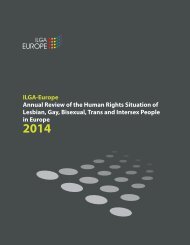Create successful ePaper yourself
Turn your PDF publications into a flip-book with our unique Google optimized e-Paper software.
pashe sas le rusura, thaj kon zha nel von karin<br />
gele, amen kothe mukle.<br />
Rakhlam jekh kheres, kothe cirdam amen.<br />
Po trin chaso le kozake kothe resle. Po kerdino<br />
drom kade xuttyenas le grastenge kopiti hoj<br />
kode gindisarasas: le nymacura avile palpale te<br />
mudaren amen. Ame, roma zhi pe kode, feri po<br />
deshujekh zhene ashlyilam, le majbut mule. Ba,<br />
na le nyamcura, tena le rusura avile.<br />
Pala kodo aba sas so te khas, ba so le rususra<br />
kirade, kodo uzho chiken sas. But zhene nasvale<br />
kergyile. Inke majmishto oprelas e she resko<br />
tifusi, le manhusengi rinza kethane gelas, pe<br />
kodo xaline opre. Sas manca jekh majphuri<br />
romani romnyi, kode phendas: nahoj te xan, na<br />
dijajven, hoj shaj chajon. Te kiravena ando lonpalyi<br />
gilche, kodo te xan.<br />
Kode phende le rusura: kothe zhan, kaj ka -<br />
men. So tumen faj, kodo sa tumaroj. Tena ka mel<br />
varekon kothe te del, den duma le ruson ge,<br />
kodola maj lenle. Lam aba ame pala kode<br />
amenge. Me ande jekh shtala rakhlem pulyura,<br />
ingerdem anda le desen, kodolen kiradam avri.<br />
(…)<br />
Maj anglal kade gindisardam, aba akanak sigo<br />
khere resas. Ke na. Majna po shtar shon reslem<br />
khere. Trubusardas te zhukarav, tavel sastruno<br />
drom.<br />
Maj anglal le romen ingerde. Kethena avi lem<br />
jekha vlaxojkasa, kode phendas mange, hoj le<br />
ungrike manusha avna maj palune, te vi von le<br />
nacenge sluge sas. Maj sigo khere te kamav te<br />
resav, te zhav andre ando komendovo, te phenav<br />
jek anav. O komendovo delas ávri le hirtije, hoj<br />
sode zhnen ingerde khere. Phen dem jekh anav,<br />
gunkat. Háromkor a kozákok megérkeztek. A<br />
csinált úton annyira pattogzott a lovak patái,<br />
hogy azt hittük: a németek jöttek vissza megölni<br />
minket. Mi, cigányok addigra tizenegyen<br />
maradtunk csak, a többi meghalt. De nem a né -<br />
metek, hanem az oroszok jöttek.<br />
Utána már volt mit enni, de amit az oroszok<br />
fôztek, az tiszta zsír volt. Sokan megbete ged tek.<br />
Még jobban felkapott a hastífusz, az em be rek<br />
gyomra össze volt menve, arra ettek rá. Volt<br />
velem egy idôsebb cigányasszony, az mond ta:<br />
nehogy egyetek, ne örüljetek, hogy jóllakhattok.<br />
Ha sóba-vízbe fôtt krumplit találtok, azt<br />
egyétek.<br />
Azt mondták az oroszok: oda mentek, ahova<br />
akartok. Ami tetszik nektek, az mind a tiétek.<br />
Ha nem akarja az illetô odaadni, szóljatok<br />
orosznak, az majd elveszi. Szereztünk már mink<br />
aztán magunknak. Én egy ólban találtam<br />
tyúkokat, vittem belôle tizet, azt fôztük ki.<br />
(…)<br />
Eleinte azt gondoltuk, most már gyorsan hazaérünk<br />
De nem. Majdnem négy hónapra kerültem<br />
haza. Megkellett várni, hogy legyen vasút.<br />
Legelôször a románokat szállították. Összejöttem<br />
egy román asszonnyal, az mondta nekem,<br />
hogy a magyarok lesznek a legutolsók, mert ôk<br />
is náci bérencek voltak. Ha haza akarok jutni<br />
hamarabb, menjek be a komendóra, mondjak<br />
egy nevet. Ez a komendó adta ki a papírokat,<br />
hogy hányat szállítanak hazafelé. Mondtam egy<br />
nevet, meg Nagyszebent, megyek a ro má nok -<br />
hoz. Aláírták, másnap már vagonokba is tettek<br />
minket. Losoncra értünk, mondta az asszony,<br />
hogy itt szálljak le, mert Magyarországra érve<br />
the hooves of the horses were so loud that we<br />
thought the Germans had come back to kill us.<br />
By then, we, Roma, were only eleven, the others<br />
had died. But not the Germans, but the<br />
Russians who came.<br />
After that we had food, but the Russian<br />
dishes were greasy. Many of us got sick. Typhoid<br />
fever was spreading even more because people,<br />
whose stomach had contracted, ate a lot. There<br />
was an older Romani woman with me who<br />
said I should not eat, and that I should not be<br />
glad to have enough. ‘If you find a potato boiled<br />
in salty water, eat that!’ – she said.<br />
The Russians said: You go wherever you<br />
want to. You eat what you like, this is all yours.<br />
When somebody does not want to give it to<br />
you, then tell the Russians and they will take it<br />
for you. So we got food for ourselves. I had<br />
found chickens in a roost, I bought ten of them<br />
and we cooked them.<br />
(…)<br />
At first, we thought we would get home quickly.<br />
But it was not so. It took me almost four<br />
months to get home. I had to wait for a train.<br />
First they transported the Romanians. I met<br />
a Romanian woman who said Hungarians<br />
would be the last because they had been the<br />
hirelings of the Nazis. So if I wanted to get<br />
home earlier, I should go to the headquarters<br />
and say that I want to go to Nagyszeben, to the<br />
Romanians. They had signed the papers, and<br />
the next day put us in wagons. When we arrived<br />
at Losonc, the woman told me: ‘Get off because<br />
when we arrive at Hungary, they will close the<br />
doors and you will have to come to Romania<br />
65



